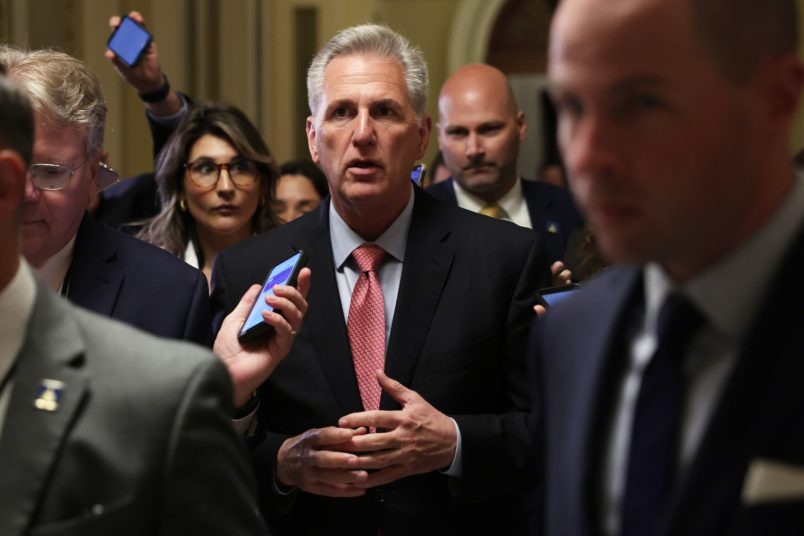It’s House Speaker Kevin McCarthy’s (R-CA) first major (self-imposed) legislative showdown.
It’s the first time his ability to marshal Republicans from both wings of the party will be so publicly put to the test. And it’s the biggest spotlight trained on him since his own agonizing bid for the speakership in January, a 15-round fiasco where he ultimately had to shell out concessions to his hard-right peers to win their votes.
Some of the same dynamics permeate this go-round. McCarthy is trying to pass a bill to start “negotiations” with President Joe Biden over the debt ceiling. In other words: the right wing of the party — with little to no protest from the rest of it — has taken the debt ceiling hostage, prompting McCarthy to hand over a ransom note full of far-right priorities so he can blame Biden when (or, hopefully, just if) Republicans let the economy collapse.
McCarthy is taking the “just ram it through and hope it gets the votes” approach in an attempt to keep his caucus on board. After this week, the House goes on recess until May 9; McCarthy is trying to use that tight window to get the bill through committee and passed on the floor before people have time to defect.
That hasn’t stopped some of his members, emboldened in the knowledge that he has extremely tight margins to work with, from making sounds about voting down the bill.
They occupy two broad buckets. You have your right-wing, “we just like saying no to everything and getting attention along the way” types — your Reps. Matt Gaetzes (R-FL) or Lauren Boeberts (R-CO). Rep. George Santos (R-NY) seems to have positioned himself here, too, and wants to make the work requirements attached to federal programs more rigorous (I suppose being a fabulist takes a full, rigorous 40 hours a week).
A bloc of midwestern Republicans is also threatening to revolt over the repeal of ethanol tax credits, passed by Democrats as part of the Inflation Reduction Act.
McCarthy had Republicans in and out of his office all Thursday afternoon, including potential holdouts like House Freedom Caucus Chair Scott Perry (R-PA), who wouldn’t commit to supporting the bill and said he hopes to see “some changes” in terms of intensifying work requirements. The smell of Chick-fil-A permeated the hallway outside McCarthy’s foxhole.
Both Perry and Rep. Byron Donalds (R-FL), who also stopped by the leader’s haunt, indicated that there are other holdouts among their hard-right peers.
“I think that we have a couple who have questions,” Donalds told reporters, adding that he thinks the bill will ultimately pass.
McCarthy and team plan to get the bill through committee Tuesday, and, if all goes according to plan, take a floor vote as early as Wednesday. McCarthy told reporters late Tuesday that he won’t reopen the bill to make adjustments and appease the holdouts, putting its future — and the timing of the vote — in doubt.
Though Democrats are stuck in the House minority, members at the House Rules Committee hearing Tuesday evening took advantage of the procedural step to lambaste the package their Republican peers are trying to push over the finish line.
“This is extortion,” Ranking Member Jim McGovern (D-MA) said. “If Democrats don’t give Speaker McCarthy everything he wants, Republicans want to literally push the entire economy off a cliff.”







Too late, Qevin. Your head is on the block and the axe is fallling.
"McCarthy is trying to pass a bill to start “negotiations”
He doesn’t even have a clear ‘win’ here. Even if it passes and he doesn’t look like the fool he is, so what?
Nancy wouldn’t need a bill to pass to “start negotiations”.
I call BS – Republicans would like to push the economy off the cliff even if they get everything they are demanding. Always assume Goalposts will be moved
I should never, ever wish failure on someone.
But I do on this fool.
I love how my own representative has a dishonest screed up on Twitter saying Republicans are negotiating in good faith